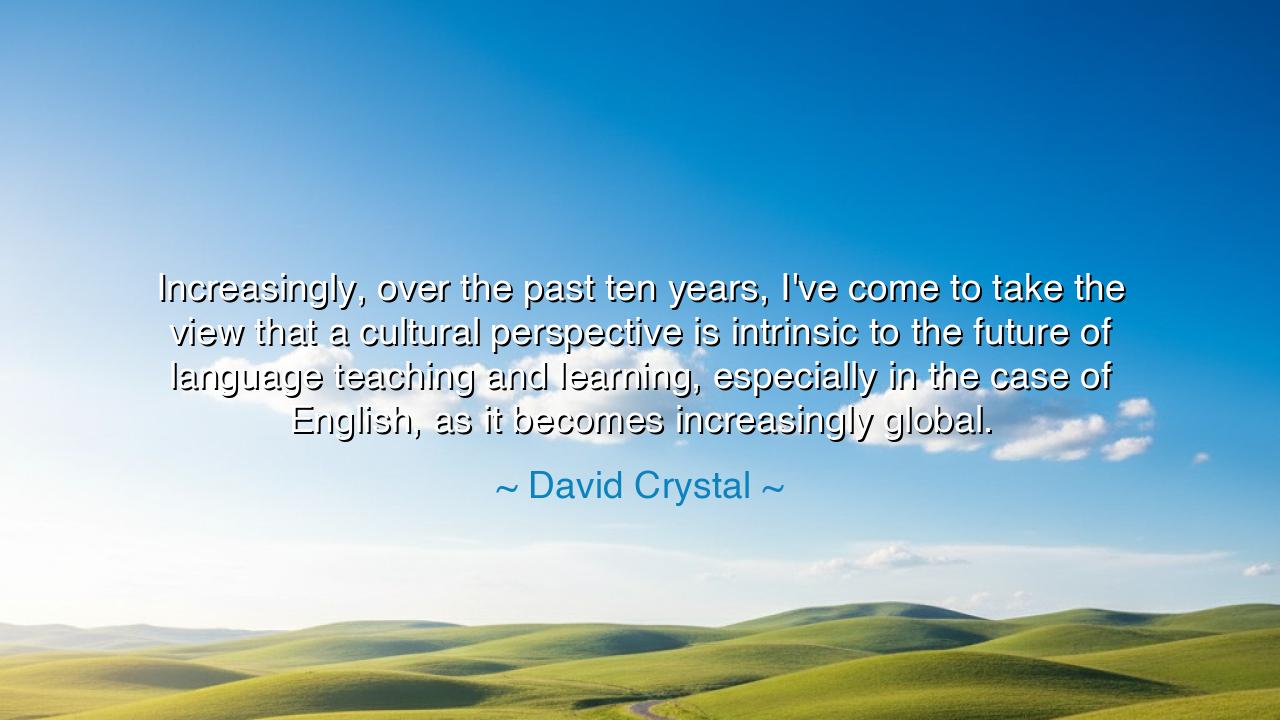
Increasingly, over the past ten years, I've come to take the view
Increasingly, over the past ten years, I've come to take the view that a cultural perspective is intrinsic to the future of language teaching and learning, especially in the case of English, as it becomes increasingly global.






In the wise and perceptive words of David Crystal, a scholar whose voice has shaped our understanding of language in the modern age, we are reminded of a truth both profound and urgent: “Increasingly, over the past ten years, I’ve come to take the view that a cultural perspective is intrinsic to the future of language teaching and learning, especially in the case of English, as it becomes increasingly global.” These words are not a mere reflection of academic thought, but a vision—a call to recognize that language is not a cold mechanism of grammar and syntax, but a living bridge of culture, carrying within it the spirit, history, and identity of those who speak it.
To grasp the depth of Crystal’s insight, we must remember that language and culture are as inseparable as body and soul. A language without culture is lifeless—a collection of sounds and symbols stripped of meaning. When a student learns a language, they do not merely learn how to form sentences; they learn how another people see the world, how they express joy, sorrow, honor, and belonging. Thus, Crystal’s message is this: that to teach language without teaching its culture is to give the student a map without a landscape, a melody without a rhythm. The future of language learning, he warns, depends on reuniting these two halves of understanding.
The English language, in particular, carries a unique destiny. Once the tongue of a single island, it has now become a global language, spoken in every land, adapted by every people. But with this expansion comes transformation. English is no longer the possession of one nation or one tradition—it has become a shared heritage, molded by the cultures that adopt it. In India, it sings with the rhythm of ancient poetry; in Africa, it dances with new idioms and tonalities; in Asia, it flows with grace and precision. To teach English today, therefore, is to teach not just one culture, but the diversity of humanity itself. The teacher becomes not only a linguist, but a guide through the living museum of global thought.
Consider the tale of Ngũgĩ wa Thiong’o, the Kenyan writer who began his literary career in English but later turned to writing in his native Gikuyu language. He did so not out of rejection, but revelation—he saw that language carries the soul of a people. To write in English, he realized, was to speak through another’s lens; to write in Gikuyu was to reclaim the rhythm of his ancestors. His journey reminds us that every language holds within it a cultural heartbeat, and that true learning of any tongue must honor that pulse. When we teach English—or any language—without context, we risk turning words into shells, beautiful but empty.
David Crystal, through his lifelong study of linguistics, has observed that English is no longer the “language of empire” but the language of connection—a tool through which people from distant lands communicate ideas, art, and innovation. Yet, if this connection is to remain human, it must be rooted in mutual respect for culture. To learn another’s language is to enter their home; to do so without understanding is to arrive uninvited. A cultural perspective in teaching ensures that learners do not simply borrow a language, but participate in its living story. They come not as imitators, but as contributors to its evolving identity.
In this, there lies both wisdom and warning. If we treat English—or any global language—as a neutral code, stripped of its cultural hues, we risk creating generations of speakers who can converse fluently but understand nothing deeply. The power of communication then becomes hollow, divorced from empathy. But when we teach through the lens of culture, every phrase becomes a thread binding us to others. We begin to see that language is not just about words, but about worldview—about how one culture names the rain, another names the stars, and another names love. Each is a reflection of its people’s soul.
Therefore, O student and teacher of the word, let this be your guiding flame: to learn or teach a language is to enter into a covenant of understanding. Do not learn words alone—learn the stories that shaped them. Do not memorize grammar—feel the rhythm of thought that beats within it. Watch the gestures, hear the humor, sense the silence between phrases, for in those subtleties lie the heart of a people. When you teach, teach with reverence for culture; when you learn, learn with humility and wonder.
And so, remember the wisdom of David Crystal: that the future of language learning rests not in textbooks or translations, but in the embrace of culture. For the world grows smaller even as its voices grow more diverse. To understand one another, we must not only share words, but honor the histories that gave birth to them. Let every lesson in language, then, be an act of connection—an offering of respect, and a bridge between souls. For in this sacred exchange, humanity moves closer to harmony, and words once divided by borders become instruments of unity.






AAdministratorAdministrator
Welcome, honored guests. Please leave a comment, we will respond soon